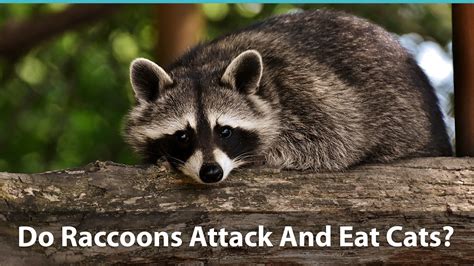As a cat owner, it's essential to be aware of the potential threats to your pet's safety. One of the most significant dangers to your cat's well-being is raccoons. These masked bandits may look cute and harmless, but they can pose a significant risk to your feline friend. In this article, we'll explore the five ways raccoons threaten your cat's safety and provide you with tips on how to protect your pet.
Raccoons are known to be curious and opportunistic animals, and they can easily become a nuisance to cat owners. With their dexterous hands and sharp teeth, raccoons are capable of causing harm to your cat in various ways.

1. Physical Attacks
Raccoons are known to be fierce and territorial, and they will not hesitate to attack your cat if they feel threatened or if they're competing for food. Raccoons are larger and stronger than most domestic cats, and they can inflict serious injuries with their sharp claws and teeth. If you live in an area with a high raccoon population, it's crucial to take measures to protect your cat from physical attacks.
Protecting Your Cat from Physical Attacks
To protect your cat from physical attacks, make sure to:
- Keep your cat indoors, especially at night when raccoons are most active
- Install a sturdy fence around your yard to prevent raccoons from entering
- Remove any food sources that may attract raccoons, such as pet food and bird seed
- Consider using a motion-activated sprinkler or ultrasonic repellent to deter raccoons from your yard

2. Disease Transmission
Raccoons are carriers of various diseases, including rabies, distemper, and leptospirosis. If your cat comes into contact with a raccoon, it may be at risk of contracting one of these diseases. Raccoons can transmit diseases through bites, scratches, or contact with their saliva, urine, or feces.
Protecting Your Cat from Disease Transmission
To protect your cat from disease transmission, make sure to:
- Keep your cat up-to-date on its vaccinations, including the rabies vaccine
- Avoid letting your cat roam freely, especially in areas with high raccoon populations
- Wear gloves when handling your cat if it's been in contact with a raccoon
- Wash your hands thoroughly after handling your cat or its food and water bowls

3. Food Competition
Raccoons are opportunistic feeders, and they will eat almost anything they can find. If you leave your cat's food outdoors, raccoons may see it as a free meal. This can lead to competition for food, and your cat may not get the nutrition it needs. Additionally, raccoons may also contaminate your cat's food and water bowls with their saliva and feces, putting your cat at risk of disease transmission.
Protecting Your Cat's Food from Raccoons
To protect your cat's food from raccoons, make sure to:
- Feed your cat indoors, or use a secure outdoor feeding station
- Use a raccoon-proof bird feeder or pet food container
- Remove any food sources that may attract raccoons, such as pet food and bird seed
- Consider using a motion-activated sprinkler or ultrasonic repellent to deter raccoons from your yard

4. Shelter Competition
Raccoons are excellent climbers, and they can easily access your cat's outdoor shelter or house. If raccoons take over your cat's shelter, it may leave your cat without a safe place to rest or hide. This can be especially problematic during extreme weather conditions or when your cat needs a safe place to escape from predators.
Protecting Your Cat's Shelter from Raccoons
To protect your cat's shelter from raccoons, make sure to:
- Use a sturdy and secure outdoor shelter or house that raccoons cannot access
- Install a raccoon-proof roof or covering to prevent raccoons from climbing on top of the shelter
- Consider using a motion-activated sprinkler or ultrasonic repellent to deter raccoons from your yard
- Remove any debris or clutter that may attract raccoons to your cat's shelter

5. Stress and Anxiety
Raccoons can be a significant source of stress and anxiety for your cat. If your cat sees or encounters a raccoon, it may become fearful or anxious, leading to behavioral problems or health issues. Raccoons can also disturb your cat's natural behavior, causing it to become more aggressive or withdrawn.
Reducing Your Cat's Stress and Anxiety
To reduce your cat's stress and anxiety, make sure to:
- Keep your cat indoors, especially at night when raccoons are most active
- Provide your cat with a safe and secure shelter or house that raccoons cannot access
- Remove any food sources that may attract raccoons, such as pet food and bird seed
- Consider using a pheromone spray or diffuser to calm your cat and reduce stress and anxiety







What should I do if I encounter a raccoon in my yard?
+If you encounter a raccoon in your yard, stay calm and keep a safe distance. Avoid feeding or approaching the raccoon, as this can make it more aggressive. Instead, try to scare it away by making loud noises or using a motion-activated sprinkler.
How can I protect my cat from raccoons?
+To protect your cat from raccoons, keep it indoors, especially at night when raccoons are most active. Also, remove any food sources that may attract raccoons, such as pet food and bird seed. Consider using a motion-activated sprinkler or ultrasonic repellent to deter raccoons from your yard.
What diseases can raccoons transmit to cats?
+Raccoons can transmit various diseases to cats, including rabies, distemper, and leptospirosis. Keep your cat up-to-date on its vaccinations, and avoid letting it roam freely, especially in areas with high raccoon populations.
